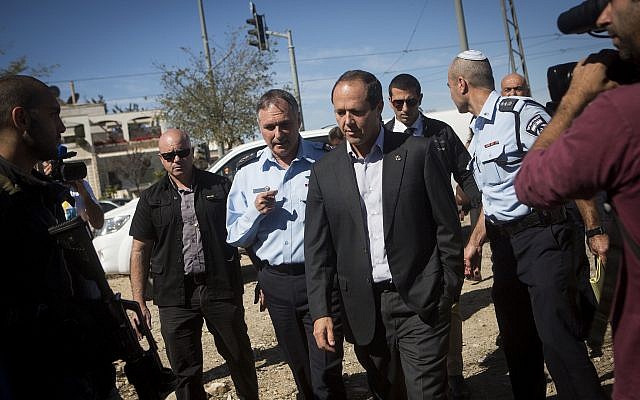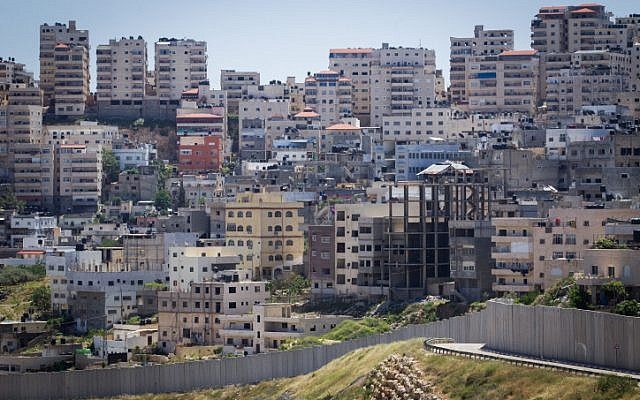Nir Barkat walks the streets of Shuafat, meets city sanitation workers who enter Palestinian neighborhood for the first time, as part of plan to replace UNRWA in capital

Jerusalem Mayor Nir Barkat, center right, arrives for a tour in the East Jerusalem neighborhoods of Beit Hanina and Shuafat. October 22, 2014.
(Miriam Alster/Flash90)
Jerusalem Mayor Nir Barkat visited Shuafat in East Jerusalem on Tuesday as part of his drive to push the United Nation’s Palestinian refugee organization out of the capital and replace its operations with municipal services.
Barkat met with city sanitation workers who entered the Palestinian neighborhood for the first time ever to carry out trash removal and other cleaning services.
...According to the city, workers found hundreds of tons of untended garbage and construction waste. They will start entering the camp daily to gradually take over what the city called UNRWA’s “inadequate services.”
The municipality will also start to provide “far superior” education, health, and other services to the area, to replace UNRWA, it said in a statement.
While Shuafat is within the Jerusalem city limits, municipal workers, police, and others have never entered ...[the area] which is situated beyond the West Bank security barrier, leading to charges of official neglect. Barkat, who has been mayor since 2008, has blamed the shortfall in services on UNRWA, which has recently had its funding slashed by the US, amid accusations that it serves as a political tool against Israel.
“The era of UNRWA in Jerusalem is over,” Barkat said during his visit. “The time has come to stop the refugee lie in Jerusalem. There are no refugees in our city, only residents. They must receive their services from the municipality like any other resident.Earlier this month, Barkat detailed his proposal, according to which the seven UNRWA-run schools — with a total of 1,800 students — that operate without a license from the Education Ministry will be closed at the end of the current academic year, and the pupils absorbed into existing municipal schools.
“We are implementing the first phase of the UNRWA evacuation plan by taking responsibility for the cleanliness of the camp, and in the near future, together with the government, we will also provide education, welfare, and health services there until full sovereignty is achieved,” he added. “The United States does not want UNRWA, Israel does not want UNRWA, and the residents do not want UNRWA.”
The municipality will also issue closure orders for UNRWA’s medical centers, which operate without approval from the Health Ministry, and construct a new public health center in their place, Barkat said.
Existing UNRWA-run welfare programs operating within Shuafat and nearby Kufr Aqeb will continue, but will be transferred to the governance municipality welfare and employment services, according to Barkat’s plan.

The Shuafat refugee camp in East Jerusalem.
(Miriam Alster/Flash90)
...The United States was the biggest contributor to the agency’s budget in 2017, donating $350 million. The US State Department said recently it would no longer fund UNRWA because it was “irredeemably flawed.”
In its announcement of the cuts to UNRWA, the US State Department castigated the agency for what it called “failed practices,” and indicated that it rejected the criteria by which UNRWA defines Palestinian refugees, conferring refugee status not only on original refugees, but on their millions of descendants.
UNRWA has provided aid to millions of Palestinians since it was established nearly 70 years ago, just after Israel’s 1948 War of Independence.
UNRWA recognizes over 5 million Palestinians as refugees, even though there are only several tens of thousands of original Palestinian refugees still alive. Palestinian leaders demand a “right of return” to today’s Israel for all these millions — a demand Israel sees as a bid to destroy Israel as a majority-Jewish state. Because UNRWA, uniquely, confers refugee status on descendants of the original refugees, Israel charges UNRWA with perpetuating that demand for a “return” of millions. Under the UN’s global criteria, it is estimated that there would be only some half a million recognized Palestinian refugees.


